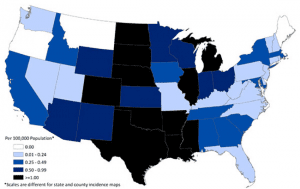“Our test will improve the accuracy of diagnosis, leading to the proper treatment of patients affected by WNV,”
While the United States has largely been spared the scourge of mosquito-borne diseases endemic to the developing world—including yellow fever, malaria and dengue fever—mosquito-related illnesses in the US are on the rise. One pathogen of increasing concern in the U.S. is an arbovirus known as West Nile.
Now Qiang “Shawn” Chen, a researcher at Arizona State University’s Biodesign Institute and a professor in the College of Technology and Innovation has developed a new method of testing for West Nile, using plants to produce biological reagents for detection and diagnosis.
The new research, conducted by Chen and his colleagues at the Center for Infectious Diseases and Vaccinology recently appeared in the Journal of Biomedicine and Biotechnology.
“One critical issue in WNV diagnosis concerns the difficulty of distinguishing WNV infection from other closely related diseases, such as St. Louis encephalitis and dengue fever, due to the cross-reactivity of antibodies among flaviviruses,” Chen says. “It is important to develop better diagnostic tools with enhanced accuracy for both treatment and diagnostic purposes.”
Thus far, the 2012 outbreak of West Nile in the United States is on track to be one of the worst on record. According to the Center for Disease Control, 48 states have reported West Nile virus infections in people, birds, or mosquitoes as of October 9th of this year.
To date, 4,249 cases of West Nile virus disease have been reported in humans, including 168 deaths. Of these cases 2,123 (50 percent) appeared in the more severe or neuroinvasive form of the disease, causing meningitis and encephalitis, while 2,126 cases were classified as non-neuroinvasive.
These figures represent the highest number of West Nile cases reported to the CDC since 2003, with nearly 70 percent reported from eight states: Texas, California, Louisiana, Mississippi, South Dakota, Michigan, Oklahoma, and Illinois. Over a third of total cases have been reported from Texas.
The alarming upswing in West Nile cases coupled with their broad geographic distribution demand new techniques for both diagnosis and treatment. Chen and his colleagues have been exploiting the power of plant biotechnology to achieve these goals.
Earlier, Chen’s group developed the first successful plant-derived therapeutic to combat West Nile post-infection, reporting their results in the Proceedings of the National Academy of Science. The current study advances efforts to create a diagnostic test for West Nile that will overcome barriers of existing methods, including limited accuracy, prohibitive cost and scalability.
via Arizona State University
The Latest Streaming News: West Nile Virus updated minute-by-minute
Bookmark this page and come back often
Latest NEWS
Latest VIDEO








